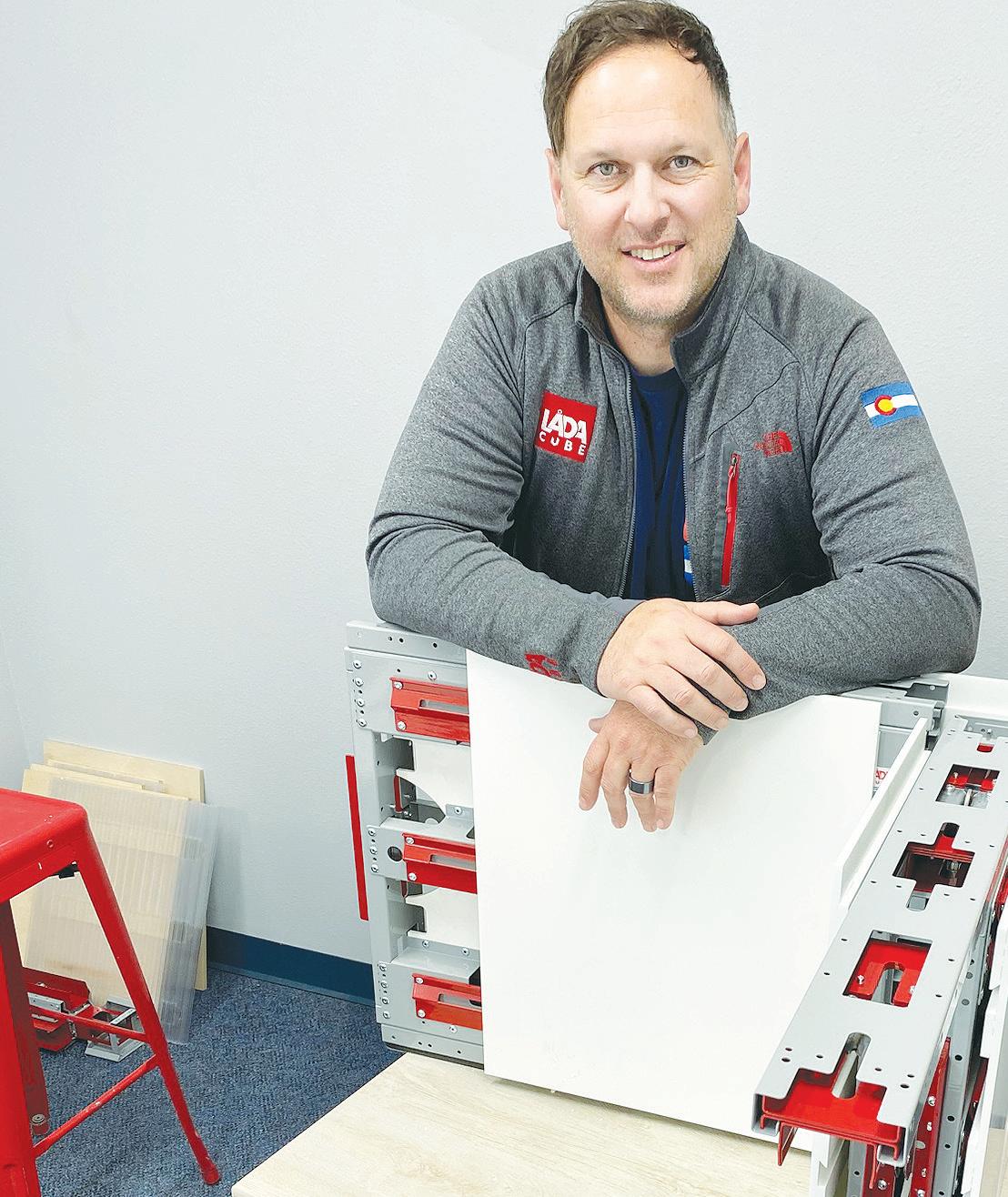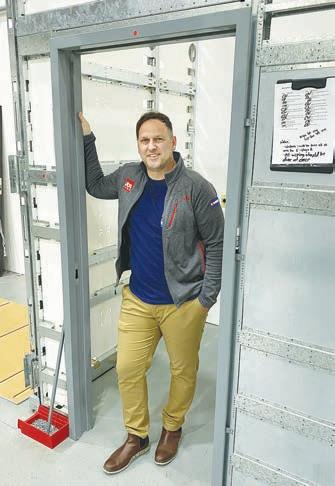In this issue
n Focus on care
The former president of St. Mary’s Medical Center has a new role, but the same goal in promoting quality care.

n Insuring change
Monument Health has entered into a new relationship with SelectHealth to offer insurance products starting next year.
n Expansive effort
Leitner-Poma has announced plans to expand operations in Grand Junction as well as build a new facility in Utah.

n Taxing matters
Sales tax collections, one measure of retail activity, continue to trend up in Mesa County, but at a slower pace.
n Retreating rate
The jobless rate dropped in Mesa County to its lowest level since December even as seasonal hiring increased.
2 4 4
Companies to watch
n Four Grand Valley firms selected as finalists in program recognizing innovative ventures.
See page 2
THE BUSINESS TIMES Business People
John Fay, founder and chief executive officer of Låda Cube, oversees a Grand Junction-based company that designs and manufactures moveable and reusable wall systems.

n Labor law update
An upcoming conference in Grand Junction will offer a variety of sessions addressing labor law issues.
THE DEFINITIVE SOURCE FOR GRAND JUNCTION BUSINESS NEWS SINCE 1994 APRIL 27-MAY 10, 2023 VOLUME 30, ISSUE 8
Almanac 30 Business Briefs 28 Business People 30 Contributors 21-25 News 2-18 Opinion 26-27 Trends 19-20 PRSRT STD U.S. POSTAGE PAID PERMIT NO. 67 The Business Times 609 North Ave., Suite 5 Grand Junction, CO 81501 21
19
n Departments 6 Business
Times photos by Phil Castle
Kaibab Sauvage, left, and Patric Matysiewski operate Sauvage Spectrum, a Palisade winery whose products include still and sparkling wines.
His focus on care continues
Former St. Mary’s exec takes on a new role with insurance provider
 Phil Castle
Phil Castle
Dr. Brian Davidson switched from the provider to the payer side of the health care industry.


But Davidson said the experiences and expertise he developed as a physician who served as president of St. Mary’s Medical Center in Grand Junction serve him well in his latest role as a market medical executive with Cigna Healthcare. Moreover, his focus on caring for people and communities hasn’t changed.
In helping develop ways for the insurance company to reward high-quality health care delivered at a lower cost, everyone wins, he said. “That’s the exciting part.”
Davidson returned to Grand Junction to lead a seminar at the BeaconFest expo on the Medicare health care program. He said it was first time back in the Grand Valley since he stepped down as president of St. Mary’s in 2019. He resigned to return with his family to Denver and his wife, Dr. Amy Gagnon, could resume her practice in maternal and fetal medicine.
Davidson joined St. Mary’s as chief medical officer in 2014 and became president in 2016.
An anesthesiologist who realized his aspiration to become a hospital administrator, he said he believed his career as a health care provider would continue.
But a unique situation arose with a position at Cigna Healthcare in which he could apply his experience as a physician with a business background to the payer side of the industry. “I was attracted to the opportunity.”
He holds both medical and master’s of business administration degrees and was one of only a few physicians who also served as hospital executives.
Davidson works in a mountain states region that includes Colorado, New Mexico and Utah as well as Oregon and Washington. Cigna Healthcare is expanding in the region, he said, and working with Monument Health based in Grand Junction to provide insurance products to residents of Mesa and Delta counties.
See CARE page 14
Companies to watch
Grand Valley winery among local firms selected as finalists in Colorado program

Patric Matysiewski and Kaibab Sauvage bring a passionate and innovative approach to growing grapes and making wines. But none of the pretension.
It’s a combination the owners of Sauvage Spectrum say has resulted in unique and popular products as well as growing recognition for the Palisade winery and vineyard.
Two different organizations named the operation winery of the year. Now, Sauvage Spectrum is among the latest finalists in the Colorado Companies to Watch program honoring fast-growing firms for their innovative products, unique processes and marketplace performance.
Three other Grand Valley companies also were selected as finalists: JFS, Låda Cube and Lyttle’s Fleet Maintenance.
A total of 74 finalists will be honored at a reception and expo set for April 27 at the Hyatt Regency Denver Tech Center. The 50 winners will be announced at an awards dinner scheduled for June 16. Matysiewski says he’s excited for the additional recognition for what’s been a lot of hard work since he partnered with Sauvage to start the winery in 2019.
“It’s very much appreciated.”
See WINERY page 18
Diverse businesses share commonalities, including commitment to customer service
The owners of JFS, Låda Cube and Lyttle’s Fleet Maintenance manage far different companies. But they also share some things in common in overseeing fast-growing operations that provide unique products and services and emphasize customer service.
What’s more, the three Grand Valley companies also are among the finalists in the 2023 Colorado Companies to Watch awards program. Sauvage Spectrum is a finalist as well. The program honors privately held second-stage companies headquartered in Colorado with between $750,000 and $50 million in annual revenue and six to 99 employees. Since the program began in 2009, nearly 700 firms have been recognized.
Curtis Englehart, executive director of the Grand Junction Economic Partnership, says those businesses play an important role in economic development in driving growth in employment and capital investments. “Their success is a great example of how companies can grow and thrive in our community.”
JFS provides consulting and accounting services to rural health care providers. Låda Cube designs and manufactures moveable and reusable modular wall systems. Lyttle’s Fleet Maintenance provides a range of installation and maintenance services for commercial vehicles.
See BUSINESSES page 16
THE BUSINESS TIMES News
Almanac Page 2 The Business Times aPril 27-May 10, 2023 STORIES AND PHOTOS BY PHIL
Trends Contributors Business People
CASTLE
Kaibab Sauvage, left, and Patric Matysiewski pull a sample of wine from a barrel at Sauvage Spectrum. The Palisade winery and vineyard is among four Grand Valley firms selected as finalists in the Colorado Companies to Watch program recognizing fast-growing and innvoative ventures.
The Business Times
Brian Davidson
John Fay, founder and chief executive officer of Låda Cube, walks through the doorway of a modular wall system from the Grand Junction-based firm.
Curtis Englehart


April 27-MAy 10, 2023 The Business Times pAge 3
Monument Health enters into new payer relationship for West Slope expansion
A Grand Junction-based health care organization has entered into a new relationship to offer additional insurance products in Mesa and Delta counties next year.
Monument Health has entered into a relationship with SelectHealth. Pending regulatory approval, SelectHealth will offer Medicare Advantage as well as individual insurance products to Mesa and Delta County residents through the Colorado insurance exchange.
SelectHealth is a subsidiary of Intermountain Health, which recently merged with SCL Health, which operated St. Mary’s Medical Center in Grand Junction. SelectHealth serves a total of more than 1 million members in Idaho, Nevada and Utah.
As the largest clinically integrated network in Western Colorado with 75,000 members, Monument Health is well positioned to introduce new health insurance options, said Ashley Thurow, executive director of the organization.

“SelectHealth is a well-known and respected integrated health plan, and we are thrilled to support their work as they
expand to the Western Slope,” Thurow said. “Monument Health and SelectHealth are mission-aligned as we both strive to help people live their healthiest lives through innovative, value-based care agreements.”

Monument Health will work with hospitals, clinics and other health care providers in its network to prepare for the entry of SelectHealth in the Colorado market during the open enrollment season later this year, Thurow said.

“Monument Health is excited to add another valued payer relationship to our network,” she said. “We want to work with insurance companies that align with our mission and desire to embrace valuebased care as we feel these relationships positively impact our community. As our network grows to include more payer relationships, Monument Health is able to expand our breadth and depth, which means health care continues to get better for everyone we serve in Western Colorado.”

Curt Howell, market president of the SelectHealth Peaks Region, said he’s pleased to work with Monument Health providers. “We are in this for the long haul and dedicated to ensuring access to highvalue care, providing superior service and supporting the health of the members and communities we serve.”
Leitner-Poma announces plans for Grand Junction,


Utah facilities
A cable transportation company has announced plans to expand its manufacturing operation in Grand Junction as well as construct a new facility in Utah.
Leitner-Poma of America has purchased five acres adjacent to its 100,000-square-foot facility in Grand Junction to expand its manufacturing capacity.

Leitner-Poma also will build a $27 million facility in Tooele, Utah, about 35 miles southwest of Salt Lake City. At 130,000 square feet, the new facility will be the largest for the company in the United States and serve as headquarters for Skytrac, a subsidiary ropeway manufacturer. The factory is expected to open in 2024.
“This new Utah-based facility will allow us to continue to grow our American-made capabilities while expanding our existing headcount in Utah by up to 60 percent,” Daren Cole, president of Leitner-Poma stated in a news release.
“New ropeway systems are rising at a record-setting pace worldwide,” Cole stated. “The output from this new campus, as well as our work to further onshore our supply chain, positions us to better meet the growing demand throughout the country.”
The new facility in Utah will include the installation of a 162-foot-tall wind turbine capable of generating 250 kilowatts of electricity — enough to meet the needs of the operation.
The wind turbine was developed by Leitwind, an affiliate company of LeitnerPoma.
The Skytrac headquarters in Utah will serve as a showcase for the technology. If market demand materializes as expected, the facility could manufacture the turbines, Cole stated.
Page 4 The Business Times aPril 27-May 10, 2023 The Business Times 609 North Ave., Suite 5 Grand Junction, CO 81501 (970) 424-5133
The Business Times is published twice monthly and distributed throughout Grand Junction, Fruita and Palisade. Advertising rates and deadlines are available upon request. Opinions expressed in this publication are those of the writers and don’t necessarily reflect the views of the publisher, editor or advertisers. Copyright © 2023 — All rights reserved
www.thebusinesstimes.com
F
Ashley Thurow
F
Daren Cole
Grants to help promote Colorado strategies for economic development
New grants will help fund the development and implementation of comprehensive economic development strategies (CEDS) across Colorado.
A planning tool encouraged by the U.S. Economic Development Administration, CEDS have been shown to help regional economic development initiatives attract new investments and lead to more consistent, positive outcomes when funding is secured.
Colorado Gov. Jared Polis and the Rural Opportunity Office within the Colorado Office of Economic Development and International Trade announced the $40,000 grants.

“Colorado’s rural communities are home to strong and thriving businesses, and this exciting grant builds upon our work to boost our strong economy and make sure Colorado remains the best place to live, work and do business,” Polis said.
Eve Lieberman, executive director of the Colorado Office of Economic Development and International Trade, also praised the effort. “Providing funding for CEDS development continues the Polis administration’s work to build a Colorado economy that works for everyone. State economic development efforts that take into account regional priorities and strategies to grow strong, diversified economies result in better long-term economic growth.”
The funding announcement comes as Colorado becomes one of six states selected to participate in a policy academy run by the Center for Regional Economic Competitiveness (CREC) to boost the success of economic development initiatives by aligning state and regional strategies and actions.
The Rural Opportunity Office will join statewide partners Region 10, the Economic Development Council of Colorado and Eastern Colorado Council of Governments in coordinated and collaborative economic development programs.
“It is an honor to be selected for the CREC policy academy and a testament to the work the Rural Opportunity Office and its partners are doing to foster and sustain a thriving economy across Colorado. We look forward to implementing the strategies we develop while also growing interstate relationships that support our efforts,” said Katharina Papenbrock, director of the Rural Opportunity Office.
Colorado is among the first states to implement a model of economic development planning that incorporates regional goals and outcomes into statewide strategies. Referred to as “nesting,” the Economic Development Administration encourages this type of planning through the development of regional and statewide economic development strategies.

Over the past 40 years, EDA studies have shown that grants awarded to regions with CEDS tend to have more consistent, positive outcomes. They are often a requirement for federal funding as well. Within Colorado, 10 regions have established CEDS and four haven’t.
“By offering grants for CEDS development and implementation, the Rural Opportunity Office wants to ensure that all 14 economic development regions across Colorado have the opportunity to experience more sustained, long-term economic growth and the ability to apply for future EDA funding,” said Greg Thomason, senior program manager and eastern rural representative with the Rural Opportunity Office.
Eligible Colorado regions without a certified CEDS plan are invited to develop one through a noncompetitive, reimbursable grant process. The grants, made possible by funding from the EDA, will cover up to $40,000 toward the cost of a contractor to help develop a new regional CEDS plan.
Similarly, Colorado economic development regions with existing CEDS plans have the opportunity to apply for noncompetitive, reimbursement grants of $40,000 to complete a qualified project or project phases identified in their plans. This program is funded through the Rural Technical Assistance program.

“We are thrilled to be partnering with OEDIT and economic development stakeholders across Colorado in CREC’s policy academy, which aligns directly with EDCC’s newly board-led initiative to focus on strengthening Colorado’s economy by aligning regional and statewide economic development efforts,” said Kim Woodworth, executive director of the Economic Development Council of Colorado
The work enabled by these regional CEDS implementation grants will ultimately inform statewide economic development planning. The Rural Opportunity Office will coordinate a statewide process intended to incorporate regional plans and goals, benefit all of 64 counties in Colorado, facilitate future applications to EDA programs and create economic development strategies for key Colorado industries.
April 27-MAy 10, 2023 The Business Times pAge 5
F
Jared Polis
Mesa County sales tax collections trend upward
Sales tax collections, an indicator of retail activity, continue to increase in Mesa County, but at a slowing pace.
Mesa County collected more than $3.4 million in sales taxes in March. That’s a gain of nearly $32,000 and nine-tenths of a percent over the same month last year. March collections reflect February sales.
The county also collected $331,860 in use taxes — nearly all of that on automobiles purchased outside the county, but used in the county. That was a decrease of more than $19,000 and 5.5 percent from the same month a year ago.
Tax collections on retail sales totaled almost $2 million in March, a decline of more than $26,000 and 1.3 percent from the same month a year ago. Declines in collections on the sale of home improvements, automobiles and clothing offset gains
in five other categories. Tax collections on the sale of general merchandise rose 3 percent.
Sales collections for other industries exceeded $1.4 million, a gain of more than $58,000 and 4.3 percent over the same month a year ago Collections increased in the wholesale, hotel and restaurant and construction sectors, but decreased in the manufacturing and telecommunications sectors.

For the first quarter of 2023, Mesa County collected nearly $11.4 million in sales taxes. That’s an increase of almost $415,000 and 3.8 percent from the first quarter of 2022.
The county collected almost $1 million in use taxes during the first quarter of 2023. That’s a decline of $3,613 and four-tenths of a percent from the first quarter of 2022.
Hotchkiss ranching operation awarded
A more than century old family ranching operation in Delta and Montrose counties has won statewide recognition for its conservation efforts.
The LeValley Ranch near Hotchkiss was selected to receive the 2023 Colorado Leopold Conservation Award. A formal award presentation is scheduled for June as part of the Colorado Cattlemen’s Association annual convention in Steamboat Springs.
The Chico Basin Ranch in Colorado Springs and Round River Resource Management of Rush also were finalists for the award.
Named in honor of the conservationist Aldo Leopold, the award recognizes ranchers, farmers and forestland owners who inspire others with their dedication to land, water and wildlife habitat management on private, working lands. The Sand County Foundation and national sponsor American Farmland Trust present the Leopold Conservation Award to landowners in 27 states for achievement in voluntary conservation.
In Colorado, the $10,000 award is presented with the Colorado Cattlemen’s Association, Colorado Cattlemen’s Agricultural Land Trust, USDA-Natural Resources Conservation Service, American AgCredit, CoBank, Farm Credit of Southern Colorado and Premier Farm Credit.
“CCA warmly extends its congratulations to the LeValley family on their well-deserved recognition and for being leaders in Colorado’s conservation and ranching industry and beyond,” said Philip Anderson, president of the Colorado Cattlemen’s Association.
Started by Thomas LeValley in 1914, the ranch subsequently has been operated by his son, Byron, and grandsons Mark, Hank and Steve.
Their rangeland conservation practices and irrigation upgrades have increased water efficiency, biodiversity, crop production and wildlife habitat. A deferred grazing system, specialized water infrastructure and the removal of invasive trees and shrubs have all been implemented to provide critical habitat for endangered Gunnison sage grouse.
The LeValley’s joined with five other ranches in operating a custom meat packing plant and retail store.
Erik Glenn, executive director of the Colorado Cattlemen’s Agricultural Land Trust, also praised the LeValley family for its efforts. “Their community involvement and leadership are both admirable and representative of the efforts of Colorado’s farm and ranch families to not only produce healthy food and fiber, but also improve and sustain ecological landscapes and Colorado’s rural communities.”
Page 6 The Business Times aPril 27-May 10, 2023
F
F

April 27-MAy 10, 2023 The Business Times pAge 7
Data security firm adds industry veteran to board


A data security firm headquartered in Grand Junction has added an industry veteran to its board of directors to help manage growth.

Cloudrise announced Dave Roshak joined its board.

Founder and chief executive officer of DMR Capital, Roshak also served in leadership roles at Optiv Security, Insight Enterprises and Level (3) Communications.
“I hope to leverage the lessons I have learned over the past 20 years to enable Cloudrise to continue to scale and execute their strategy initiatives,” Roshak said. “I believe Cloudrise is uniquely positioned to benefit from two of the largest megatrends in enterprise IT today — the shift of
enterprise applications and processes to cloud-based platforms and the increasing complexity of managing an effective information security program.”
Rob Eggebrecht, founder and chief executive officer of Cloudrise, hailed the addition. “Dave has been part of helping build some of the largest telecom and cybersecurity service providers in the world. He has vast experience with helping organizations scale and raise capital, but he’s also very experienced in operations management and best practices.”
Eggebrecht cited Roshak’s tenure with Optiv Security as executive vice president and chief financial officer.
“His experience helping to grow Optiv into the largest cybersecurity service provider in the U.S. is, quite frankly, unparalleled.”
Roshak said he meets with security professionals at large businesses to discuss their concerns — including the difficulties they face in hiring and retaining security professionals. “This is increasingly driving a shift of enterprise focus to outsourcing of discrete security functions to trusted third parties like Cloudrise,” he said. “I believe we are really only in the first inning of this shift.”
Cloudrise provides a range of services to companies to assess their capability to protect data and offers them automated processes and other resources as well as management services. For more information, visit the website at www.cloudrise.com.
Work proceeding on Grand Junction recreation center
The City of Grand Junction is moving ahead with plans to construct a community recreation center following voter approval of a ballot measure to increase taxes to fund the facility.
“We are very grateful to Grand Junction voters for their support of the plan to build a community recreation center in Grand Junction,” said Ken Sherbenou, the director of the city parks and recreation department.
Sherbenou said years of community involvement through surveys, focus groups and forums helped determine the location of the center, the amenities it will offer and how the facility will be funded. That involvement will continue to play a role in the final design, he said.
The city council approved a plan to construct a community recreation center at Matchett Park. The center is expected to include a multi-sport gymnasium, fitness and weights area and indoor track as well as an aquatic center with a lap pool, leisure pool, lazy river and water playground.
Voters approved an increase in city sales and use taxes from 3.25 percent to 3.39 percent, enabling the city to increase debt up to $70 million with a repayment cost of $148.5 million to construct, equip and operate the center. Taxes on cannabis sales also will fund the facility.
The city will issue a request for proposals for architectural and engineer services. It’s expected the city council will approve contracts with the recommended firms within two to three months.
A separate request for proposals will be issued for a construction manager and general contractor. A contract with the recommended firm should come before the council within five to six months.
Design of the recreation center is expected to take about 12 months, followed by 18 months of construction. The center is expected to open late in 2025.
Page 8 The Business Times aPril 27-May 10, 2023
F
Dave Roshak Rob Eggebrecht
F
Ken Sherbenou



April 27-MAy 10, 2023 The Business Times pAge 9
Mosquito control district braces to fight the bite
Crews from the Grand River Mosquito Control District are already treating sites as they brace for increased spring runoff expected bring to more water and mosquitoes.
“It’s going to be an active season, and we are doing all we can to get ahead of it,” said Tim Moore, manager of the Grand River Mosquito Control District.
With snowpack in the Colorado basin at 150 percent of average, increased spring runoff likely will bring more water to the Grand Valley and more places for mosquitoes to breed, Moore said. Mosquitoes can lay hundreds of eggs at a time in as little as a quarter inch of water.
“Our community needs to be prepared for rising water

FOR YOUR INFORMATION
The Grand River Mosquito Control District treats more than 2,500 private properties and 10,000 breeding sites as well as public open spaces in the Grand Valley. For more information, visit https://fightthebitegj.com.
and what lies ahead. We currently have a team of 19 field technicians that will be treating more than 2,500 properties across the valley. But we truly need all the help we can get to prevent additional breeding sites.”
Moore said problems with mosquitoes can be avoided by disposing of old tires, clearing roof gutters of debris and repairing leaking outdoor faucets. Water in pet dishes
and bird baths should be changed frequently.
“Encouraging your friends and neighbors to also eliminate sources on their own property is critical to a community wide control program,” he said. “Mosquitoes require water to complete their life cycle. If their water source is eliminated, so are their offspring.”
In addition to draining standing water, Moore said it’s important for people to remember the other two Ds of mosquito awareness — dress and defend.
People who are outside when mosquitoes are active should wear light-colored, loose-fitting clothing.
It’s important as well to apply a mosquito repellent to clothing and bare skin, he said. Repellents with DEET, picaridin, oil of lemon eucalyptus and IR3535 have been shown to be effective.
United Way launches online portal detailing volunteer opportunities
United Way of Mesa County has launched an online portal offering information about volunteer opportunities with dozens of nonprofit organizations as well as educational institutions and government entities.
“We saw a need for a centralized database of volunteer positions in our community,” said Keira Clark, the community impact and marketing manager of United Way of Mesa County.

“Many people in our community want to give back, but don’t know where to start or who to reach out to. It can be an overwhelming and sometimes frustrating process to find local volunteer opportunities that can fit into daily life. With Volunteer United, amazing local volunteer opportunities are just a click away and registering is easy. We look forward to helping agencies find the help they need to continue their mission.”
The Volunteer United portal is located at www.volunteermc.org as well as on the United Way of Mesa County website located at www.unitedwaymesacounty.org.
The Brad Dempsey American Family Insurance Agency sponsors the portal.
Those interested in volunteering can search for opportunities by causes as well as age limits, event dates and skills.
The portal is available as a free service to Mesa County organizations to post volunteer needs. United Way of Mesa County provides virtual training on using the platform. For more information about listing volunteer opportunities, call Clark at 243-5364 or send her an email at impact@uwmesacounty.org.

Page 10 The Business Times aPril 27-May 10, 2023
F
Tim Moore
F
Subscribe today to the Business Times. (970) 424-5133 www.thebusinesstimes.com
Keira Clark



April 27-MAy 10, 2023 The Business Times pAge 11
Mesa County has launched an online portal that allows people to report damages to roads or bridges as well as drainage and traffic issues.
The Road Problem Reporter platform is user-friendly, enabling easy submission of reports, including photos and descriptions of the problems.
Mesa County Public Works will review the notifications and provide an estimated response time and updates.
“We are excited to offer the Road Problem Reporter as a new tool for the community to communicate with us,” said Mesa County Commissioner Janet Rowland.

“This platform will allow us to better serve the community and improve our response time to road issues that affect our residents,” Rowland said.
Mesa County launches road problem portal Construction to soon begin on De Beque community hall
Mesa County Public Works developed the tool to improve communications between the county and residents. The platform is expected to reduce response times for reported issues and improve the overall efficiency of the county problem-solving process.
The new reporting tool is available on the Mesa County Public Works webpage located at https://www.mesacounty.us/ departments-and-services/public-works/road-problem-reporter.
Users can access the Road Problem Reporter through desktop and mobile devices.
Construction is scheduled to begin this summer on a community hall in De Beque.
The Mesa County Commissioners approved a nearly $5 million contract to construct the hall at the corner of Fourth Street and Roan Creek Drive. Construction is scheduled to conclude in the fall of 2024.
The contract approval follows open house events at the De Beque Town Hall to hear comments from residents on the amenities they wanted in a community hall and the activities offered at one.
The community hall will feature a full commercial kitchen, indoor and outdoor areas for gatherings, restroom facilities and a playground.
The project is part of a county effort to build community halls in De Beque and Clifton as well as Whitewater and the Loma and Mack area. The estimated cost of all four halls, including land acquisition, initially was estimated at $8 million.
The community halls were proposed prior to an election in 1981 in which voters approved a measure imposing a 2 percent county sales and use tax, half of which is earmarked for capital improvements.
The oil shale bust followed, as did other economic downturns that made it difficult for the county to fulfill that promise. Increased tax collections and other resources are now available that enable Mesa County to proceed with the effort.
Interstate Highway 70 resurfacing project set to start on May 2
Resurfacing work on a three-mile stretch of Interstate Highway 70 east of De Beque is scheduled to begin May 2.
United Companies of Grand Junction is the contractor on the project.
“This project will create a smoother, safer ride for residents and commuters on this busy section of I-70 that is critical for the Western Slope,” said Shoshana Lew, executive director of the Colorado Department of Transportation. “CDOT is committed to improvements along the entire I-70 corridor. These surface and safety improvements are part of that effort and build on efforts last year across the corridor, including in nearby stretches close to Rifle.”
Work will include the placement of a 2-inch hot mix asphalt overlay, striping, rumble strip installation, guard rail replacement, three culvert treatments, bridge repair and bridge rail replacement.
Motorists should anticipate other nearby projects on I-70 as well as Colorado Highway 13. Travelers can monitor traffic and road conditions on the website located at www.cotrip.org.

Page 12 The Business Times aPril 27-May 10, 2023
F
Janet Rowland
F
F



April 27-MAy 10, 2023 The Business Times pAge 13
Care
Continued from page 2
Davidson said he brings to his latest position experience in clinical settings and hospital administration, but also finance and public policy.
He said he’s met with physicians, hospital staff and other health care providers about what they need to care for patients as well as lower the cost of that care. “I’ve had those conversations.”
Payers play an important role in reforming health care, he said, by the way in which they reward providers for quality care rather than strictly fees for services.
Preventive measures and better managing chronic conditions not only help patients lead healthier lives, but also reduces the need for more expensive care later, he said.
It’s important as well to address social determinants of health, he said. That includes access to safe housing and nutritious food as well as employment, education and transportation.
The United States spends more money per capita than any other country on health care — by one estimate for 2021, nearly $13,000. That’s nearly double the spending levels of other wealthy countries, including Germany, Switzerland and Canada.
Davidson said the U.S. offers some of the most advanced medical technology and treatments in the world and there’s nowhere else he’d want to go for care.
But at the same time, a lot of resources in the United States are allocated for what he termed sick care rather than health care.
The situation isn’t sustainable and must change, he said. Reform efforts are under way. And even small changes that lower spending on health care a percent or two will make a cumulatively big difference.
While he’s switched from the provider to the payer side of the health care industry, Davidson said his mindset hasn’t changed. “I believe in taking care of people.”
Horse adoption event planned for Meeker
The U.S. Bureau of Land Management has scheduled a wild horse adoption event for April 28 and 29 in Meeker.
Trainers participating in the Meeker Mustang Makeover event will choose their horses. About a dozen horses will be available for adoption by the public.
The event is set for the Rio Blanco Fairgrounds. Bidders may view the horses from noon to 7 p.m. April 28 and must be present to place a bid during a silent auction set for 3 to 3:30 p.m. April 29.
The event also also include training demonstrations and clinics. The trainers participating in the event will return in August for training competitions and auctions.


For more information about the BLM wild horse and burro adoption program in Colorado, visit www.blm.gov/WHB or call (866) 468-7826.

Page 14 The Business Times aPril 27-May 10, 2023
F
F



April 27-MAy 10, 2023 The Business Times pAge 15
Businesses

Continued from page 2
Kelly Johnston, founder of president of JFS, hailed the selection of her business as a finalist in the Colorado Companies to Watch program as validation of efforts to help rural health care providers. “It’s a mission I’m really passionate about.”
Johnston launched JFS in 2016 and initially provided services to small businesses. That direction changed after the firm served as an interim chief financial officer for a medical center.
JFS subsequently evolved to provide consulting, accounting and other services to rural hospitals and other health care providers to help them operate more efficiently and, in come cases, remain open for their patients, Johnston said.
Another important change occurred after JFS changed its pricing and service structure to better meet the needs of clients, she said.
JFS recently served as chief financial officer for the St. Vincent General Hospital District, which afforded the firm an opportunity to work with state legislators and health care policymakers.
Johnston also attributed the success of the company to her staff. “My team is amazing.”
John Fay, founder and chief executive officer of Låda Cube, also said he was excited about his firm’s selection as a finalist in the Colorado Companies to Watch program. “We were super honored.”
Fay launched Låda Cube in 2013 to provide selfcontained and self-standing modular wall systems for office, retail, residential and other uses.
He relocated the headquarters of Låda Cube from California to Grand Junction, returning to the place in which he grew up. A grant from the Colorado Office of Economic Development and International Trade helped
FOR YOUR INFORMATION

n For additional information about JFS, call (970) 623-3752 or log on to the website at https://jfsconsultingco.com.
n For more information about Låda Cube, call (833) 438-5232 or visit www.ladacube.com.
n For more information about Lyttle’s Fleet Maintenance, call (909) 322-1463 or log on to https://lfm-lyttlesfleet.com.
the company expand operations in the state.
Låda Cube soon moved into a 15,000-square-foot facility on Railroad Avenue in Grand Junction. But the operation will move again in May into an even larger facility at 17,000 square feet with room to further expand to more than 40,000 square feet, Fay says.
Låda Cube also operates manufacturing facilities in South Africa and Mexico. A location could open in Canada as well.
Låda Cube modular wall systems offer a number of advantages, Fay says, including speed of installation and moveability and reusability. The systems work especially well for commercial buildings in which retail tenants want to reconfigure their spaces.
Walmart has become one of the biggest customers, he says, in using the wall systems for vision centers and optometry offices as well as health care centers. Crews can install the systems in a matter of days with none of the noise and mess associated with more traditional construction.
Fay envisions many other uses for the systems, though, including housing. The systems can be quickly assembled into houses and accessory dwelling units. “Housing is such an issue worldwide.”
The systems could change housing and even financing for housing, he says. The systems can be quickly disassembled and moved to other locations. It’s also possible to sell back the systems to be refurbished and used elsewhere.
There’s also the potential for using the systems at data centers and channel heat generated by computers for other uses, including adjacent greenhouses, he says.
Gary and Carissa Lyttle relocated Lyttle’s Fleet Maintenance from California to Grand Junction in 2021 in part to operate from a more centralized location to better serve their customers. Tax incentives offered through the Rural Jump-Start Program helped as well, Gary Lyttle says.
The moved proved a good one, he says, as the business has continued to grow. “It’s been a treat.”
The operation outgrew its location in the former Halliburton facility and has nearly completed the move to a facility on 22 Road with 17,000 square feet of space on 10.5 acres.
Lyttle’s Fleet Maintenance provides a range of installation and maintenance services for commercial vehicles.
The company takes new trucks directly from manufacturers and installs truck beds and other parts to finish the vehicles. The company also customizes vehicles to meet the individual needs of customers and their businesses, Lyttle says. “We can make the truck for the customers specs.”
Lyttle’s Fleet Maintenance works closely with customers to help them determine what they need and what will work best, he says.
In addition, the company maintains and refurbish vehicles.
Page 16 The Business Times aPril 27-May 10, 2023
F



April 27-MAy 10, 2023 The Business Times pAge 17
Winery
Continued from page 2
Sauvage is a grape grower who’s farmed in the Grand Valley for more than 20 years. Matysiewski is a winemaker who worked on several project with Sauvage.
The two joined forces in making wines from 30 varietals grown on 70 acres of vineyards.

In operating what’s known as an estate winery, Sauvage and Matysiewski use only grapes from vineyards they control. And their wines stay on their premises throughout the production process.
They make a variety of wines, including popular sparkling wines bottled under Sparklet labels. Matysiewski describes it as a lifestyle brand that’s both approachable and affordable.

They also bottle sparkling wines under Pet-Nat labels, short for the French term petillant naturel describing a process in which the wine is bottled with the right amount of sugar for fermentation to continue and produce natural carbonation.
Sauvage and Matysiewski enjoyed almost immediate success. The Colorado Association for Viticulture and Enology and Manufacturer’s Edge both presented Sauvage Spectrum with its winery of the year awards.
The winery produced 4,800 cases of products its first year and bit less in 2022, Sauvage says. But production likely will increase in 2023.
They operate out of a 5,000-square-

FOR YOUR INFORMATION

Sauvage Spectrum is located at 676 38 1/4 Road in Palisade. For additional information, call 464-2127, or visit the website at https://sauvagespectrum.com.
foot facility in Palisade that houses their production liness as well as storage and a tasting room.
Sauvage and Matysiewski opened a second tasting room in 2021 in the Wright Building in Ouray.
They distribute their products to a total of nearly 200 liquor stores and restaurants across Colorado as well sell online.
Not content to rest on any proverbial laurels, Sauvage and Matysiewski say they expect to continue to expand the operation. That could include an addition to their production facility in Palisade as well as third tasting room somewhere in Colorado.

As for growing grapes and making wines, they plan to plant new varietals and bottle new products. “We’ll keep innovating,” Matysiewski says.
But it’s not a matter of quantity, he says, but quality.
Sauvage agrees. “We just want to be the best.”
Forget about pretentiousness, though. “We really aren’t,” Sauvage says. F
toCompanies watch
Page 18 The Business Times aPril 27-May 10, 2023 THE BUSINESS Business PeopleAlmanac THE DEFINITIVE SOURCE FOR GRAND JUNCTION BUSINESS NEWS SINCE 1994 APRIL 27-MAY 10, 2023 VOLUME 30, ISSUE 8 2 4 4 In this issue n Focus on care Theformerpresidentof St.Mary’sMedicalCenter has a new role, but the same goalinpromotingqualitycare. n Insuring change MonumentHealthhasentered intoanewrelationshipwith SelectHealthtoofferinsurance productsstartingnextyear. Leitner-Poma has announced planstoexpandoperations in Grand Junction as well as buildanewfacilityinUtah. n Taxing matters Sales tax collections, one measureofretailactivity, continuetotrendupinMesa County,butataslowerpace. n Retreating rate Thejoblessratedropped inMesaCountytoitslowest level since December even asseasonalhiringincreased. n Labor law update Anupcomingconference inGrandJunctionwilloffer avarietyofsessions addressinglaborlawissues. Almanac 30 Business Briefs 28 Business People 30 Contributors 21-25 News 2-18 Opinion 26-27 Trends 19-20 PRSRT STD U.S. POSTAGE PAID PERMIT NO. 67 The Business Times 609Ave.,NorthSuite GrandJunction,CO81501 21 19 n Expansive effort n Departments 6 BusinessTimesphotosbyPhilCastle n Four Grand Valley firms selected as finalists in program innovativerecognizing ventures. See page 2 JohnFay,founderand chief executive officer ofLådaCube,oversees a Grand companyJunction-based thatdesigns andmoveablemanufacturesreusableandwall systems.
KaibabSauvage,left,andPatric MatysiewskioperateSauvage Spectrum,aPalisadewinery whoseproductsincludestilland sparklingwines. Expiration CVV
Patric Matysiewski, left, and Kaibab Sauvage produce a variety of wines at Sauvage Spectrum. Some of their most popular products, though, are sparkling wines bottled under Sparklet labels. (Business Times photo by Phil Castle)
INDICATORS AT A GLANCE
n Business filings
s New business filings in Colorado, 48,806 in the fourth quarter, up 37.2 percent from the fourth quarter of 2021.
n Confidence
t Consumer Confidence Index 101.3 for April, down 2.7.
s Leeds Business Confidence Index for Colorado, 45.1 for the second quarter, up 5.3.
t National Federation of Independent Business Small Business Optimism Index 90.1 for March, down 0.8.
n Foreclosures
t Foreclosure filings in Mesa County, 19 in March, down from 54 in March 2022.
t Foreclosure sales in Mesa County, 1 in March, down from 5 in March 2022.
n Indexes
t Conference Board Employment Trends Index,116.24 for March, down 0.51.
t Conference Board Leading Economic Index 108.4 for March, down 1.2%.
t Institute for Supply Management Purchasing Managers Index for manufacturing, 46.3% for March, down 1.4%.
n
Lodging
s Lodging tax collections in Grand Junction, $254,659 for December, up 16% from December 2021.
n Real estate
t Real estate transactions in Mesa County, 328 in March, down 33.7% from March 2022.
t Dollar volume of real estate transactions in Mesa County, $136 million in March, down 33% from March 2022.
n Sales
s Sales and use tax collections in Grand Junction, $6 million for December, up 7.4% from December 2021.
s Sales and use tax collections in Mesa County, $3.7 million for March, up 0.3% from March 2022.
n Unemployment
t Mesa County — 3.1% for March, down 0.7.
t Colorado — 2.8% for March, down 0.1.
t United States — 3.5% for March, down 0.1.
Unemployment rate drops With increased seasonal hiring, Mesa County labor market tightens
Phil Castle The Business Times
AREA JOBLESS RATES
News Trends Contributors Opinion Business Briefs Business People Almanac
The monthly unemployment rate in Mesa County has dropped to its lowest level since December. The decline reflects in part an increase in seasonal hiring, but also signals more competition for employers in filling job openings. While signs point to the possibility of recession, Mesa County should fare better with a more diversified economy, said Lindsay Bullock, director of the Mesa County Workforce Center in Grand Junction. “I think we’re in a great spot right now.”
The seasonally unadjusted unemployment rate fell seven-tenths of a point to 3.1 percent in March, according to the latest estimates from the Colorado Department of Labor and Employment. That’s the lowest level since the rate also stood at 3.1 percent in December and matches the lowest level since before the onset of the COVID-19 pandemic in early 2020. At this time last year, the rate was higher at 3.8 percent.
Between February and March, Mesa County payrolls edged up 74 to 74,802. The number of people counted among those unsuccessfully looking for work decreased 583 to 2,396. The labor force, which includes the employed and unemployed, shrank 509 to 77,196.
Over the past year, payrolls increased 673 or nearly 1 percent. The ranks of the unemployed decreased 559. The labor force inched up 112.
Bullock said the low jobless rate constitutes something of a “mixed bag” because it means more people are working, but employers face more difficulty in filling job openings. Some employers have found success with more creative approaches, including job sharing and part-time positions as well as training students.
The number of job orders posted at the Mesa County Workforce Center increased in March to 879, Bullock said. That’s
up from the 760 orders posted in the same month last year.
She attributed the gain to an increase in seasonal hiring for positions in construction and other outdoor work as well new businesses and expansions. For the first quarter of 2023, 2,184 orders were posted. That’s down from the 2,570 orders posted during the first quarter of 2022.
Although already low, Bullock said the jobless rate could slip a bit lower heading into the summer months. Job growth is forecast for most industry sectors.
Signs point to the possibility of a recession. But a more diversified economy should help Mesa County fare better if a downturn does occur, she said.

Seasonally unadjusted unemployment rates also dropped in neighboring Western Colorado counties in March — eighttenths of a point to 3.6 percent in Delta County and 2.9 percent in Montrose County and seven-tenths of a point to 2.9 percent in Rio Blanco County and 2.6 percent in Garfield County.
The statewide seasonally adjusted jobless rate edged down a tenth of a point to 2.8 percent, remaining below 3 percent for an 11th consecutive month.
Nonfarm payrolls shrank 4,700 between February and March with declines in the professional and business services and trade, transportation and utilities sectors more than offsetting a gain in services. Private sector employment fell 6,200 while government payrolls increased 1,500.
Over the past year, nonfarm payrolls increased 33,400 or 1.2 percent. The largest gains were reported in the leisure and hospitality, professional and business services and educational and health services sectors. Employment decreased in the fnancial activities and constuction sectors as well as the trade, transportation and utilities sector.
Over the past year, the average workweek for Colorado employees on private, nonfarm payrolls lengthened two-tenths of an hour to 33.1 hours. Average hourly earnings increased $1.49 to $35.21.
Index: Consumer expectations not so great
A monthly measure of consumer confidence has declined on less upbeat expectations for business and labor conditions.
The Conference Board reported its Consumer Confidence Index fell 2.7 points to 101.3 in April.
A component of the index tracking consumer assessments of current conditions increased. But a component tracking their short-term outlook decreased and remains at level signaling a recession within the next year.
“Compared to last month, fewer households expect business conditions to improve and more expect worsening of conditions in the next six months. They also expect fewer jobs to be available over the short run,” said Ataman Ozyildirim, senior director of economics at the Conference Board, a member-driven think tank based in New York.

The decline reflects less optimism in particular among consumers under 55 years old and for households earning $50,000 and more, Ozyildirim said.
Consumers said they expect to decrease spending on homes, automobiles, appliances and vacations, a signal they could be economizing amid growing pessimism. Expectations for inflation
over the next year were essentially unchanged at 6.2 percent. The Present Situation component of the index rose 2.2 points to 151.1 in April.
The proportion of consumers who responded to the household surveys upon which the April index was based who described business conditions as “good” remained unchanged from March at 18.8 percent. The share of those who called conditions “bad” fell 1.2 points to 18.1 percent.
The proportion of consumers who said jobs were “plentiful” rose a half point to 48.4 percent. The share of those who said jobs were “hard to get” fell three-tenths of a point to 11.1 percent.
The expectations component of the index retreated 5.9 points to 68.1. The component has remained below 80 for 13 out of the last 14 months. Readings below 80 are associated with a recession within the next year.
The share of consumers who said they expect business conditions to improve over the next six months fell 2.9 points to 13.5 percent. The proportion of those who said they anticipated worsening conditions rose 2.3 points to 21.5 percent.
The share of consumers who said they expect more jobs to become available fell three points to 12.5 percent. The proportion of those anticipating fewer jobs rose a half point to 21 percent.
F April 27-MAy 10, 2023 The Business Times pAge 19
F
March Feb. t Delta County 3.6 4.4 t Garfield County 2.6 3.3 t Mesa County 3.1 3.8 t Montrose County 2.9 3.7 t Rio Blanco County 2.9 3.6
Lindsay Bullock
Ataman Ozyildirim
Index forecasts economic slowing

A monthly index forecasting economic conditions in the United States has retreated to its lowest level in more than two years, signaling a growing possibility of recession.
The Conference Board reported its Leading Economic Index fell 1.2 percent to 108.4 in March. The index has declined for a full year, dropping to its lowest level since November 2020. A separate measure of past performance also decreased in March, although a measure of current conditions increased.
The Leading Economic Index fell 4.5 percent over the past six months, a steeper decline than the 3.5 percent drop over the six months before that.
“The weaknesses among the index’s components were widespread in March and have been so over the past six months,” said Justyna Zabinska-La Monica, senior manager of business cycle indicators at the Conference Board.
A member-driven think tank based in New York, the Conference Board forecasted growing economic weakness leading to a recession starting in mid-2023. Gross domestic product expanded at an annual rate of 2.6 percent in the fourth quarter of 2022 and 3.2 percent in the third quarter.
For March, seven of 10 components of the Leading Economic Index retreated, including building permits, consumer expectations, interest rate spread, leading credit and new orders indexes and stock prices. An increase in average weekly claims for unemployment benefits also pulled down the index.


New orders for consumer and capital goods increased. Average weekly manufacturing hours remained unchanged.

The Lagging Economic Index fell two-tenths of a percent to 118.3. The index has held steady over the past three months.
For March, four of seven components of the index retreated, including commercial and industrial financing as well as changes in the cost of labor and services. An increase in the duration of unemployment also pulled down the index. The average prime rate charged by banks, consumer credit and inventories all advanced.
The Coincident Economic Index increased two-tenths of a percent to 110.2. The index rose eight-tenths of percent over the past six months.
For March, all four components of the index rose — industrial production, nonfarm payrolls, personal income and sales.
Page 20 The Business Times aPril 27-May 10, 2023
F
Justyna Zabinska -La Monica
COMING ATTRACTIONS
n The next monthly maker meetup is set for May 1 at the Business Incubator Center in Grand Junction.
The meetup is scheduled for 6 to 8 p.m. at the GJ MakerSpace at the center, located at 2591 Legacy Way. The event will offer participants an opportunity to meet other makers, talk about ideas and show off projects.
To register for or obtain more information about upcoming events, programs and services at the Business Incubator Center, call 243-5242 or log on to https://gjincubator.org.
n Colorado Mesa University has scheduled its Entrepreneurship Day luncheon for noon May 2 at the University Center Meyer Ballroom in Grand Junction.
Corey Ciocchetti, an author and college professor, is expected to deliver the keynote address on leadership and inspiring ethical integrity and character.

The event also will include the presentation of the Excellence in Entrepreneurship Award honoring entrepreneurs who’ve contributed to the economic development of the region.
Tickets sell for $65. Table and leadership sponsorships also are available. For tickets or more information, visit the website located at www.SupportingCMU.org/Eday.
n The next Coffee Club free networking meeting is set for 9 to 10 a.m. May 19 at the F Works conference room, 325 E. Aspen Ave. in Fruita. The meeting also will include a presentation on tax credits available through the Mesa County Enterprise Zone.
For additional information, call 858-3894 or visit https://fruitachamber.org.
n The Fruita Area Chamber of Commerce Women in Business has planned an event featuring a hike to a mica mine.
The event is scheduled for 5:30 to 7:30 p.m. May 24. Participants will meet at the trail head on Little Park Court in Grand Junction. Admission is $20 for members and $30 for others, which will include a fanny pack with snacks, wine or other beverages.
To register or obtain more information, call 858-3894 or visit https://fruitachamber.org.
Employment law update
Grand Junction conference to include a variety of sessions
For employers interested in keeping abreast of changes in employment laws — and there certainly have been a lot of them — the Western Colorado Human Resource Association has scheduled its annual spring employment law conference for May 23 at Colorado Mesa University in Grand Junction.


Bechtel & Santo, a Grand Junction law firm that specializes in advising employers on day-to-day employment issues, will present the conference in conjunction with the WCHRA. Sessions will address a variety of topics:
n Legislative and case law update. The conference is scheduled to begin with a morning session offering a legislative and case law update.
The update will cover recent and potential changes to federal and state laws, including a number of measures under consideration by the Colorado Legislature. Federal and state measures concern new discrimination and harassment standards, workers’ compensation benefits and unemployment requirements as well as changes to severance agreements. The session also will cover recent developments in federal and state case law as well as potential changes to employment and labor laws in 2023 and beyond.
n Wage and time theft. This session will cover new provisions related to the wages and work of employees. The presentation will cover what employers are required to do to avoid wage theft allegations as well as touch on such employee behaviors as quiet quitting and time theft. The discussion will address whether or not employers can cite these behaviors in defense of wage claims, maintain records of these behaviors and what employers can do when experiencing these behaviors.
n Retaliation for the exercise of legal rights and whistleblower claims. According to the U.S. Equal Employment Opportunity Commission (EEOC), more than 55 percent of claims received last year involved retaliation claims.
This session will explore how employers can protect themselves against claims and examine the recently released EEOC enforcement guidance on retaliation and related issues.
n The three “Cs” of human resource ethics: conflict, confidentiality and compassion. This session will cover the
FOR YOUR INFORMATION
Opinion Business Briefs Business People Almanac
The Western Colorado Human Resource Association has scheduled its spring employment conference for 8 a.m. to 4:30 p.m. May 23 at the Colorado Mesa University Center in Grand Junction. The conference also will be broadcast as virtual presentation over Zoom. Admission is $249 for members of the WCHRA and other Colorado chapters of the Society for Human Resource Management. Students and special guests will pay $199. Others will pay $349. To register or obtain more information, visit www.wchra.org.
ethical considerations of businesses and human resources personnel related to conflicts of interest in the workplace, confidentiality in business dealings and interactions between employers and employees.
The session also will explore how managing with compassion can help an organization interact with employees to avoid litigation or other negative outcomes.
n Family and medical leave insurance. Starting next year, Colorado employees will be able to access paid leave under the family and medical leave insurance (FAMLI) program. Between now and then, employers have the opportunity to implement attendance, financial and policy planning to ease the transition to a new system of employee rights and employer obligations.
Attendees will receive lunch as part of the conference. As always, a question-and-answer session will give participants an opportunity to ask a panel of lawyers their most pressing questions.
In sum, the conference will offer a full day of presentations and guidance on employment law issues with the goal of helping participants maintain their balance on a tight rope of requirements and work force empowerment.
Michael Santo is co-founder and managing attorney of Bechtel & Santo in Grand Junction. His practice focuses on defending companies in employment litigation, trade secret misappropriation, unfair competition and employee raiding. Reach him through the website at https://bechtelsanto.com. His column was provided by the Western Colorado Human Resource Association. For more information, visit www.wchra.org
April 27-MAy 10, 2023 The Business Times pAge 21 Trends
Contributors
F
Michael Santo
Support team members with praise and recognition
Business leaders focused on moving their companies to ever higher levels of efficiency, effectiveness, profitability and success remain vigilant for ways to improve operations and what is — and isn’t — working.
They must avoid a common pitfall, though: fixating on what’s wrong at the expense of what’s right. While this approach might produce some short-term results, it will over time damage other aspects of the business. Given their astigmatism, these leaders will fail to see all that’s accomplished, the efforts team members put forth and how far the business has progressed.
These same leaders will squash the morale of their team members with a lack of praise and abundance of criticism. Team members will become less excited about being a part of the company mission. Top performers will move on.
This will hurt efficiency and effectiveness and, in turn, the profitability and success that’s desired.

Conversely, when leaders offer well-deserved praise and recognition to team members while also working to improve operations, a solid culture is established and benefits ripple through the business.
Why?
Because when people feel good — even great — about the work they’re doing and progress they’re making, they’re encouraged to stay the course. Consider how great it feels and how motivating it is when you receive praise and recognition for your efforts.
Most people thrive on praise and enjoy recognition. When people are praised for jobs well done, they feel
valued. They’re inspired to keep up the good work. They light up and get excited, which is apparent in their body language and behavior.
When this happens repeatedly, they grow more self-confident, take on challenges with greater initiative and passion and become more adept at what they’re doing. In other words, they’re motivated in positive ways to learn, grow and become and do more.
On the other hand, when a person truly gives their best and is met with only criticism in the form of what they did wrong and what they should have done better, they feel defeated, inadequate and undervalued. If you’ve ever been on the receiving end of a situation like this, you know how unpleasant this experience can be.
Repeated over time, this criticism becomes what’s called negative conditioning and leads to diminished self-confidence, negative self-perception, resentment, disengagement, lower performance and turnover.
The desire to feel good about ourselves and the efforts we put forth constitutes a very real human need. As a leader, it’s crucial to understand this need, change your perspective and behavior and offer the praise and
recognition your team members appreciate and need to continue advancing. Positive reinforcement offers a far more effective leadership strategy than negative conditioning.
As I coach leaders how to lead from a position of composure and with a balanced perspective, they work with their teams in new, dynamic and more effective ways. They build empowered teams that produce the results they want to achieve.
In your unending pursuit of success and a finely tuned business, don’t forget to consistently provide the well-deserved praise and recognition team members need to learn, grow and become top performers in your business. Doing so will increase job satisfaction and performance and reduce costly turnover.

When team members in any business are supported in constructive ways — both for jobs well done and in those areas in which they’re striving to improve — they’ll perform at higher levels because they feel valued and encouraged to do their best.
When you give others what they want, they’re more likely to give you what you want. Everyone is happier and more successful.
Marcus Straub owns Life is Great Coaching in Grand Junction. His personalized coaching and consulting services help individuals, business owners, executives and companies build teams, organizations and lives filled with happiness and success. Straub is winner of the International Coach of the Year Award and author of “Is It Fun Being You?” He’s available for free consultations regarding coaching, speaking and trainings. Reach Straub at (970) 208-3150, marcus@ligcoaching.com or through the website located at www.ligcoaching.com. F

Page 22 The Business Times aPril 27-May 10, 2023
Marcus Straub
When this happens repeatedly, they grow more self-confident, take on challenges with greater initiative and passion and become more adept at what they’re doing. In other words, they’re motivated in positive ways to learn, grow and become and do more.
Payments due for FAMLI program
The first premium payments under Colorado’s Family and Medical Leave Insurance (FAMLI) program are due April 30. For this first submission, however, the state offers a 30-day grace period. To avoid fees, penalties and other consequences, employers must make payments by May 31.
A template is available under the “submitting your wage reports” section of the FAMLI website at https://famli.colorado.gov with separate pages for employers doing their own submissions and third party administrators.
Colorado has been soliciting and evaluating insurance company proposals to provide private plan options for employers to provide FAMLI benefits. Several insurance carriers have submitted proposed paid FAMLI policies to the Colorado Division of Insurance. A list of those insurance carriers has been posted on the private plan page on the FAMLI website. None of these proposed policies is available yet. They’re still under final review.
If you’re considering using a private plan rather than submitting premium payments and wage data to the state, you must submit a private plan application for a fully approved plan within My FAMLI+ Employer to receive formal approval from the FAMLI division.
Employers — as opposed to third party administrators — have two options for submitting premium payments through My FAMLI+ Employer.
If you’re submitting manually, read and follow the instructions in the quick reference guide on reporting wages. This guide will walk you through the process of entering wage data for each employee.
If you are submitting wage data on a bulk basis using a wage report file, read and follow the instructions in the appropriate wage
report specifications and use the associated template. Sample templates are found on the employer’s page under the submitting your wage reports section of the FAMLI website.
Self-employed individuals and independent contractors have access to FAMLI benefits, but their participation in the program is optional. You must opt in to participate.
Here are a few tips when making your premium payments:
n Read and become familiar with information on the FAMLI website.
n Use sample templates on the website to increase the likelihood of completing submissions correctly.
n Remember to round down any amount beyond a penny. Otherwise, you’ll probably get an error message. If your report shows fractions of a penny, round down to the nearest penny.
n Remember you’re filing your FAMLI premium payments and reports one quarter in arrears — just like your unemployment report. Be sure to select the first quarter of 2023, not the second quarter.
n If you need assistance, call (866) 263-2654 and a specialist will walk you through the process.


If you’re considering using a private plan, keep the following in mind:
n Obtain and read the guide for employers interested in fulfilling their FAMLI requirements by using an approved private plan.
n Review the private plan tools, including surety bond guidance, self-insured plan template, surety bond calculator and past private plan webinars.
Janet Arrowood is founder and managing director of the Write Source, a Grand Junction firm offering a range of services, including grant and proposal writing, instruction and technical writing. Reach her at janet.arrowood@thewritesourceinc.com. For more information, log on to www.TheWriteSourceInc.com.


April 27-MAy 10, 2023 The Business Times pAge 23
F
Janet Arrowood
In races and business, humility beats hubris

In Aesop’s fable about the race between the tortoise and hare, that rascally rabbit could’ve used more humility and less hubris. I believe that same thing can be said of many businesses.
Fully 85 percent of executives responding to one survey deemed maximizing talent as “very important” and 37 percent believed their employees could become top performers. Yet, less than 50 percent of executives said they’d actually invest in leadership development.
Um, what?
destruction” is basically talking about hubris.
Executives might not have run the numbers. But I have. And it’s a little frightening what companies typically leave behind.
A typical U.S. company employs around 100 employees, earns about $750,000 in annual profits and pays employees $50,000 a year each. A company paying little to no attention to leadership development also will pay little to no attention to employee empowerment and engagement.
and self-conceit should prove more powerful than wisdom?”
John C. Maxwell, the author, coach and speaker, said: “The better leader you are, the better leaders you will attract. Like attracts like is a basic principle of life. Others also say that birds of a feather flock together. If you want to play with [or attract] leaders at a certain level, you need to raise your game to match theirs. A leader who’s a seven on a scale of one to 10 will not be attracted to a leader who’s a five.”
I contend employees who exceed five on a scale of one to 10 won’t follow a leader who’s only a five.
Do you want to attract and retain great employees? Give them great leaders.
Tim Haggerty
Some companies don’t invest in leadership development because they claim it’s too difficult to measure results or return on investment. Others believe leadership development programs don’t work, so why invest time and money on them.
Um, what?
I doubt the vast majority of companies even bother to consider the true cost implications because, well, those executives simply “know better.”
That’s hubris. Writ large.
To the Greeks, hubris referred to extreme pride — pride and ambition so great it offended the gods and led to one’s downfall. Hubris was a character flaw often seen in the heroes of classical Greek tragedies, including Oedipus and Achilles. The biblical proverb “pride goeth before
In the four key employee metrics of absenteeism, turnover, engagement and disgruntlement, employers paying little to no attention to empowerment and engagement are potentially bleeding $5 million a year.
Can you expect to capture all $5 million? Probably not. But what is 10 percent worth to your bottom line? How about 20 percent? What would 30 percent of $5 million do to the bottom line of an organization pulling in $750,000 a year in profit?

I’m not be a math whiz, but I’m guessing a 200 percent increase in profits might be something to brag about. Or could it be as simple as pride obscuring the obvious conclusion?
Marcus Aurelius, the Roman emperor and philosopher, once said: “Nothing happens to anyone that he is not fitted by nature to bear. The same things happen to another and either because he fails to realize that they have happened to him or because he wants to display his strength of mind, he stands firm and remains unaffected. Is it not extraordinary that ignorance
Leaving leadership development to chance will result in a slow erosion of empowerment and engagement. Left unchecked, this leads to the decline of any organization.
Tim Haggerty and his wife, Bernadette, operate a consulting firm based in Grand Junction that helps clients transition from command and control to servant leadership and change the view of wages and benefits from expenses to investments. Haggerty brings to the venture more than 40 years of experience in operations management and a record of decreasing costs while increasing productivity and revenue. He also serves as vice president of the Grand Junction Kiwanis Club. Reach him at info@timothyhaggerty.com, (610) 737-0496 or www.timothyhaggerty.com
Get the hang of it: Suspension training offers many benefits
Developed by the Navy’s elite special operations forces, suspension training offers body weight exercises that develop balance, flexibility, strength and core stability.
Suspension training equipment consists of straps securely anchored to a bar. The straps can be adjusted to accommodate an individual’s height as well as different exercises.
Suspension training offers advantages over traditional weight training — using barbells and dumbbells, for instance — in that the training systems use little equipment and are portable. Exercises aren’t performed on the ground, which provides a level of instability. Core muscles must be engaged while using the trainer.
The major benefit to suspension training, though, is its suitability for all levels of fitness. You’re able to adjust the difficulty of each exercise merely by changing the position of your body. If you’re doing a bicep curls, for example, a more upright position allows for an easier workout. If you
A variety of exercises can be performed on a suspension trainer. By learning just a few of the hundreds of different positions, you can enjoy a total body workout.
move your feet away so your body is in a more horizontal position, more exertion will be required to pull you up into a bicep curl.
A variety of exercises can be performed on a suspension trainer. By learning just a few of the hundreds of different positions, you can enjoy a total body workout.
That’s why all four branches of the military as well as some of the top athletes all use suspension trainers in their fitness programs. Drew Brees, the former New Orleans Saints quarterback, endorsed TRX suspension trainers and incorporated it into his workout program.
According to personal trainers, yet another benefit of
suspension training is that it can be used to take pressure off joints when performing such exercises as squats and lunges. By having straps to hold on to, clients can get into a deep squat or lunge and then more easily come up.
Suspension trainers are portable and easy to install on your own. But having a personal trainer show you the exercises using proper form and assist you in getting into position helps you obtain the maximum benefit from exercises while reducing the risk of injury. Learning what positions and exercises work what muscles will help you reach your strength training goals.
While there are many ways to get fit, suspension training offers a powerful and successful tool. Learning to leverage your body weight with gravity creates a unique fitness experience.
Paula and Dale Reece own Crossroads Fitness Centers in Grand Junction with a downtown location at 225 N. Fifth St. and north location at 2768 Compass Drive. For more information, call 242-8746 or visit the website located at www.crossroadsfitness.com.

Page 24 The Business Times aPril 27-May 10, 2023
F
F
Paula Reece
Geopolitics and economic growth intertwined

Geopolitics and economic development shape each other in profound ways. Geopolitics is concerned with the relationships among geography, power and politics. Economic development refers to the process of improving the economic conditions of a particular area. Both are crucial for the growth and stability of a nation and its people.
In rural areas, these two concepts are particularly intertwined. Owing to their geographic locations, natural resources and potential for sustainable development, these areas can be strategically significant. Rural regions can play a key role in a country’s geopolitical strategy, especially in terms of resource management, security and territorial integrity.
Rural areas exert direct effects on both geopolitical and economic development. The lack of capital flow and infrastructure in rural regions might impede economic development by making it harder for new enterprises to launch and thrive. That could result in high levels of poverty and unemployment as well as escalating social and political tensions with urban areas.
Yet, rural areas offer unique resources and opportunities that can be strategically leveraged for economic growth. For example, many rural areas have access to such natural resources as water, agricultural land, minerals and timber that could be used to boost the local economy and create jobs. When leveraged well, affordability in rural areas can make them desirable sites for enterprises trying to cut costs.

Business incubators and entrepreneurship play key roles in promoting both geopolitical and economic growth, particularly in rural regions. While business incubators provide support and mentor entrepreneurs and startups, entrepreneurship is the process of developing and managing a business venture to achieve success.
In rural areas, business incubators and entrepreneurship can be especially successful in supporting economic development. Incubators can offer platforms for new businesses to grow, create jobs and strengthen the local economy. Entrepreneurship could result result in technological improvements and innovation, which also boosts economic development and competitiveness.

Many theories have been proposed to explain how economies grow through time, including neoclassical theory, classical theory and structuralist theory.
While neoclassical theory focuses on the role of market forces in resource allocation and promoting economic efficiency, classical theory emphasizes the role of savings and investment in fostering economic growth. The structuralist approach emphasizes government intervention to support economic growth, particularly in emerging nations.
There are numerous examples of effective geopolitical and economic development strategies in rural regions across the world. The European Union Common Agricultural Policy successfully promotes sustainable agriculture and rural development throughout Europe, particularly in economically disadvantaged regions. The Masdar City project in the United Arab Emirates aspires to create a sustainable urban ecosystem in the Middle East powered by clean energy. The undertaking shows how economic development and geopolitics interact to advance sustainability and environmental stewardship while simultaneously fostering economic growth and development.
A similar example of sustainable rural development can be seen in Europe. Located off the coast of Denmark, the island of Samso has reached net-zero carbon emissions through the use of wind energy, solar energy and conservation. Visitors from around the globe have come to learn about achieving sustainability.
On the East Coast of the United States, Vermont has embraced a strategy for rural economic development. Through the Vermont Sustainable Jobs Fund, the state supports the development of such green industries as sustainable agriculture, forestry and energy production in rural areas. This has not only boosted economic growth, but also helped preserve the rural way of life and promote environmental sustainability.
Geopolitics and economic development are intricately connected. In this interaction, rural regions are essential because they present unique possibilities and challenges that call for creative and situation-specific solutions. By stimulating innovation, developing capacity and encouraging cooperation, business incubators and entrepreneurship contribute to rural economic development.
Various forms of economic development theory provide insights into how this process might be accomplished, ranging from conventional methods centered on enticing outside enterprises and investments and fostering growth to more complex methods that emphasize robust support to local entrepreneurs, promoting social and environmental sustainability. By putting these theories into reality, policymakers and practitioners build more resilient, inclusive and sustainable economic systems that benefit rural and urban residents while also fostering
wider geopolitical stability and collaboration.
The role of business incubators and entrepreneurship in fostering geopolitical and economic growth can’t be underestimated. By offering tools and assistance to entrepreneurs and startups, incubators play a significant part in fostering economic growth and innovation. By providing resources like funding, mentorships and business training, incubators help develop an original concept into a flourishing company. Incubators also promote an entrepreneurial culture that could spread over a whole area.
The European Investment Fund (EIF) provides funding to entrepreneurs in Europe, directly leading to job creation and economic growth. The EIF also has assisted in the construction of incubators and accelerators — including the European Innovation Council and European Institute of Innovation and Technology — that provide resources and assistance to entrepreneurs and businesses.
The Middle East also has focused on promoting entrepreneurship and economic development. The United Arab Emirates has achieved success as a result of substantial government investments in initiatives to support entrepreneurship and innovation. The Dubai Future Accelerators connects businesses with government to provide solutions to a range of issues. The program provides funding, coaching and access to government resources — which can be a game-changer for a startup.
Geopolitics and economic growth are intertwined, and the success of one influences the other. Rural areas are vital to this relationship because they provide critical resources and help promote economic growth and innovation. Business incubation and entrepreneurship are invaluable because they provide the tools and support needed to turn unique ideas into viable businesses.
Encouraging entrepreneurship and innovation has been shown to have significant effects on geopolitical stability and economic growth in not only Europe and the Middle East, but also the United States.
Dalida Sassoon Bollig, chief executive officer of the Business Incubator Center in Grand Junction, is an experienced strategist with demonstrated work in international affairs. She brings to her duties experience in economic development, entrepreneurship, leadership, partnerships, public policy and trade. The Business Incubator Center has provided small businesses resources since 1987. For more information, call 243-5232 or visit https://gjincubator.org.
April 27-MAy 10, 2023 The Business Times pAge 25
F
Subscribe today (970) 424-5133 www.thebusinesstimes.com
Dalida Bollig
Efforts on wrong track with railroad mandates

As chief of staff to then President-elect Barack Obama, Rahm Emanuel infamously declared, “You never want a serious crisis to go to waste. And what I mean by that, it’s an opportunity to do things that you think you could not do before.”



While cynical, it’s an unfortunate rule in politics. Something terrible occurs and those who seek action — such as increased government regulation or benefits — kick into high gear in linking the tragedy to their cause.
That’s apparently been the case with railroad labor unions out to expand their reach and membership in the aftermath of the Norfolk Southern derailment in East Palestine, Ohio. They found some willing members of Congress with a bill introduced by U.S. Sens. Sherrod Brown and J.D. Vance, both from Ohio.
Railroad unions have long pushed for government to mandate crew sizes. This legislation would do just that. This is being done in the name of “safety,” although there’s no evidence to support this assertion.
It is worth highlighting some key points the Small Business & Entrepreneurship Council pointed out in an analysis relating to what the Federal Railroad Administration has considered in terms of the size of train crews and where crew members should be located on moving trains. The same points raised in that piece apply to legislation to mandate crew size.

The Small Business Administration Office of Advocacy sent comments to the FRA raising serious issues and concerns, among them:
n “According to information presented by the American Short Line and Regional Railroad Association at the roundtable and public hearing, there are some 696 short line freight railroads (Class II and III) in the United States, and all meet the SBA definition of a small business.”
n “There are currently no specific FRA regulations on crew size, but all Class I and many Class II and III railroads operate with a two-person crew. However, many short line railroads operate with one person in the locomotive cab and another in a truck or utility vehicle performing switching and other business and operational tasks and who may be assigned to multiple trains. FRA has repeatedly acknowledged that it lacks safety data to determine whether one-person crews are less safe than multi-person crews.”
n “Based on information provided at the roundtable and public hearing, it appears that FRA has significantly understated the cost to and the number of small businesses that would be impacted by the proposed rule.” At another point, it
is noted: “Survey data indicates that there are actually some 420 railroads operating with one crew in the locomotive train operations. If several hundred petitions for special approval would have to be filed, this could dramatically increase the cost to both small entities and the agency to process these petitions.”
n “A number of small businesses who spoke at the roundtable and public hearing stated that they have been conducting one-person crew operations for long periods of time with few if any safety incidents. They said that small railroads operate at very small margins and that any increase in costs could lead customers to switch to trucks (i.e., modal shift) that are less safe.”
Marc Scribner, a senior transportation policy analyst at the Reason Foundation, wrote: “During the past decade, federal and state policymakers have pursued minimum crew size rules for railroads operating in their jurisdictions. Despite the appeals to safety made by proponents of these regulations, the available evidence does not support these claims. In addition, imposing crew size minimums on economic grounds is likely to backfire by reducing the competitiveness and long-term viability of rail in the broader transportation sector.”
As the Columbus Dispatch reported: “The train that derailed in East Palestine had three crew members on board, and the National Transportation Safety Board has not identified problems with the crew’s response. Initial findings from the NTSB indicate that an overheated wheel bearing was responsible for the derailment.”
Despite the Ohio derailment, the American Association of Railroads reported: “The last decade was the safest ever for U.S. railroads, with mainline and hazmat accident rates at an all-time low.”
It’s important to understand the federal government mandating crew member size and operations will achieve nothing in terms of safety, but the costs will fall heavily on small businesses within the industry. Those served by freight rail who would face increased costs, fewer choices within the transportation sector and diminished supply chain performance.
In the end, government mandating crew sizes and operations isn’t about safety, but instead unions playing politics. Work and investments must continue to build on the vast improvements achieved in rail safety. And as the industry has made clear in recent decades, investments in technology, infrastructure and operations improve safety and performance. Government disincentivizing investment and innovation due to politics makes no sense whatsoever.
April 27-MAy 10, 2023 The Business Times pAge 27
F
Raymond Keating is chief economist for the Small Business & Entrepreneurship Council. Reach him through the website at www.sbecouncil.org.
Raymond Keating
n DONATION OF $5,000 AND 12 ACOUSTIC GUITARS TO BENEFIT MESA COUNTY MUSIC STUDENTS
Opinion Business Briefs Business People Almanac
Life by Music, a nonprofit organization dedicated to inspiring youth and those in need through the power of music, donated $5,000 to the Mesa County School District 51 Foundation. Life by Music also donated 12 Epiphone Starling acoustic guitars as part of the Gibson Gives program.
The donation follows the Moody’s Music Gala fund-raiser at Moody’s Lounge in Grand Junction.
Angela Christensen, executive director of the D51 Foundation, said the $5,000 donation will go to scholarships to help 30 students to attend the Colorado Mesa University music camp in June. The guitars will be distributed to a total of five different elementary and middle schools for use by music students.
“On behalf of the D51 Foundation, I want to say how honored we are to receive this generous donation from Life by Music in support of music students throughout Mesa County,” Christensen said.
Ryan Patrick, president and founder of Life by Music, said he was excited about the effort. “We are so thankful to have linked up with Grand Junction residents Logan Moody and Dr. Nick Sechrist to bring this event to life and raise money for D51. We all agree on one simple fact, that music can make a big difference.”
n YOGA INSTRUCTOR LAUNCHES VENTURE OFFERING CLASSES AT LOCAL BUSINESSES
Tara Szwejcer has launched Blondie Yoga to provide yoga classes at Grand Valley wineries and breweries.

A certified yoga instructor, Szwejcer offers vinyasa and hatha classes designed to increase body awareness as well as strengthen the body and mind.
By offering her services at local businesses, including wineries and breweries, Szwejcer hopes to help support businesses while also introducing people to the benefits of yoga.
For more information about Blondie Yoga, call (720) 254-0962 or send an email to blondieyogateacher@gmail.com.

NOTEWORTHY SHARE YOUR NEWS
The Business Times welcomes submissions for free publication in Business Briefs. Email items to phil@thebusinesstimes.com or submit a news release online at www.thebusinesstimes.com.
n EARTH DAY CELEBRATION SHOWCASES EFFORTS UNDER WAY AT COMMUNITY HOSPITAL
Community Hospital in Grand Junction hosted an Earth Day celebration in part to highlight conservation and sustainability efforts. The sustainability and diversity council at the hospital hosted an event that included giveaways of plants and garden seeds.
Stephanie Marsicovetere, chairwoman of the council, said the event also promoted a collaboration with the City of Grand Junction in which nearly 100 gallons of compostable food waste is collected each week. The hospital also donates leftover food from its Flying Pig Restaurant to the Food Bank of the Rockies. The hospital collects and recycles alkaline batteries, plastics and cans as well as works with Project Cure to collect and donates expired medical products and equipment to countries in need. Community Hospital provides inpatient care and a range of outpatient diagnostic services. For more information, visit the website at https://yourcommunityhospital.com.
n GRAND JUNCTION AUTO REPAIR SHOP JOINS IN CAR DONATION PROGRAM
Antonelli’s Advanced Automotive in Grand Junction joined in an effort to donate another car to a person in need of a vehicle. The automotive repair shop gave away a 2006 Chevrolet Impala. The recipient also received free oil changes for two years.
Frank Keller donated the car for the program, while Moore’s Autobody and Bookcliff Auto Parts also participated.
Antonelli’s Advanced Automotive is located at 365 Bonny St. For more information, visit www.antonellisadvancedauto.com or call 242-0580.
Upcoming Grand Junction event to showcase electric vehicles

An upcoming event in Grand Junction will showcase electric vehicles.
The Experience Electric Road Show is scheduled for April 30 at Lincoln Park. Additional events are set for May 7 in Steamboat Springs, May 21 in Eagle and June 4 in Glenwood Springs.
The event will begin at 1 p.m. with a presentation in the Lincoln Park Barn covering electric vehicle features, charging, sales trends, cost of ownership, tax credits and environmental implications.
From 2 to 5 p.m., the show will offer participants an informal ride and drive event in the adjacent parking lot to test drive new and used electric vehicles and talk with electric vehicle dealers and owners. Free child care will be available.
The Experience Electric Road Show is an effort of the Clean Energy Economy for the Region, Colorado Energy Office, City of Grand Junction, Western Colorado Alliance and Western Colorado EV Club. For additional information, log on to the website at https://cleanenergyeconomy.net/ee23.
Two businesses and three individuals were recognized for their community efforts in Fruita.
The Fruita Area Chamber of Commerce presented five awards during its annual banquet.
The Fruita chamber welcomed 138 new businesses as members in 2022. That brings to 500 the number of businesses the chamber serves.
The chamber presented its Member Business of the Year Award to Rhema Music and Clothing Co. Operated by James and Samantha Williams, the business offers musical instruments, albums and guitar lessons on one side and women’s boutique clothing on the other side.
Rhema Music and Clothing Co brings musical talent to Fruita and also joins in partnerships to stage such popular community events as the Fruita Fall Festival, Mike the Headless Chicken Festival and a Thursday night concert series.
Base Camp Provisions was named New Business of the Year. The business serves a variety of food, craft beers and other beverages as well as provides a welcoming atmosphere with an oversized patio.
Tom Griffith was selected as Citizen of the Year. The owner of Bestslope Coffee, Griffith was praised for his servant leadership and compassionate management of his staff.
Kimberly Fuoco was named Volunteer of the Year, honoring in part her efforts at the Fruita Fall Festival.
Gretchen Blackwelder was honored as Ambassador of the Year. The community development and event coordinator for Family Health West, Blackwelder helps plan the Fruita Fall Festival and Fruita Farmer’s Market as well as a silent auction conducted at the annual banquet.
Page 28 The Business Times aPril 27-May 10, 2023
F
F
Angela Christensen
The Experience Electric Road Show will return to Grand Junction with an event set for April 30 at Lincoln Park. Participants will learn about electric vehicles and have an opportunity to drive them. (Photo courtesy Jay Dyar)



April 27-MAy 10, 2023 The Business Times pAge 29
Business Briefs Business People Almanac Business Briefs Business People Almanac
n MIND SPRINGS HEALTH NAMES NEW CHIEF FINANCIAL OFFICER
Gregg Dixon has joined Mind Springs Health as chief financial officer of the Western Colorado mental health and addiction treatment provider.

Dixon will oversee the finance and accounting teams at Mind Springs Halth while also ensuring the fiscal health and compliance of the organization.
Dixon brings to his new duties more than 25 years of financial and executive experience, most recently as CFO and executive vice president at Alivia Care in Jacksonville, Fla. Before that, he was CFO and senior vice president of finance at Community CarePartners, a division of Hospital Corporation of America. A certified public accountant, Dixon holds a bachelor’s degree in accounting from Georgia State University.
“Gregg’s well-established financial career in health care and executive leadership experience will allow him to qiuckly step in and mentor and lead our finance team,” said John Sheehan, chief executive officer of Mind Springs Health. “With his transparent approach and financial acumen, Gregg will bring a new vision to the department and align the organization’s fiscal operations and strategy.”
Mind Springs Health operates the West Springs Hospital in Grand Junction and 12 offices in a 10-county region of the Western Slope. For more information, visit www.mindspringshealth.org.
n KIWANIS CLUB OF GRAND JUNCTION HONORS ACADEMIC TEAM COACH
Coady Shawcroft, a social studies teacher who coaches the academic team at Grand Junction High School, has received recognition for his efforts.
The Kiwanis Club of Grand Junction presented Shawcroft with its Educator of the Year Award.
The academic team placed first and second in the latest quiz bowl state championship and also won the state knowledge bowl tournament. The knowledge bowl title was the 24th for the Tigers.
n GRAND VALLEY RESIDENTS NAMED TO STATE AG AND HOUSING BOARDS

Kathryn Bedell of Grand Junction has been reappointed as a member at large of the Colorado Agriculture Commission. Monique Terpstra of Mack has been appointed ot the Colorado Housing Board. The agriculture commission formulates policy for the Colorado Department of Agriulture and advises the Colorado Legislature and governor.
The housing board establishes uniform standards for the constructon and maintenance of hotels, motels and manufactured housing.
SHARE YOUR NEWS
The Business Times welcomes submissions for free publication in Business People and the Almanac calendar of events. Email submissions to phil@thebusinesstimes.com or submit a news release online at www.thebusinesstimes.com.
n ENTREPRENEUR BRINGS EXPERTISE TO MERGERS AND ACQUISITIONS FIRM
Scott Bowman has launched Bowman LTD., a Grand Junction-based mergers and acquisitions firm specializing in mid-market businesses in Western Colorado.
“My focus is providing profesional M&A services to larger businesses, generally companies $2 million or greater in value,” Bowman said. “These larger operations represent only a small percentage of the businesses in Western Colorado, but often need expertise in finding the best possible buyer and navigating a sophisticated sales process.”
Bowman brings to the firm experience in owning and managing businesses in the energy, hospitality, manufacturing, marketing, professional services and technology sectors. He worked as managing partner of Meagher Energy Advisors, an energy mergers and acquisition firm in Denver, and was involved in the merger, acquisition and divesture of oil and natural gas entities and assets. He holds a business degree from the University of Colorado at Boulder and law degree from the University of Utah.

For additional information about Bowman LTD, call 424-5747 or visit www.BowmanLTD.co.
n MESA COUNTY COMMISSIONER ELECTED CHAIRMAN OF REGIONAL ORGANIZATION

Mesa County Commissioner Cody Davis has been elected chairman of the Associated Governments of Northwest Colorado.
Palisade Town Trustee Bill Carlson was elected treasurer of the organization of city and county govenrments in Garfield, Mesa, Moffat and Rio Blanco counties. Craig City Councilman Chris Nichols will remain vice chairman. Garfield County Commissioner Mike Samson is immediate past chairman.
“AGNC is essential for the comtinued economic prosperity of our rural commuities,” Davis said.
“I am honored to serve as their new chairman and humbled by the opportunity to represent the counties of northwest Colorado.”
In addition to representing the interests of cities and counties, the AGNC also serves as administrator of the Northwest Colorado Enterprise Zone and as an economic development district for the region. For more information, visit https://agnc.org.
April 27
n Western Colorado Economic Summit, 7 a.m. to 2 p.m., Colorado Mesa University, 1100 North Ave., Grand Junction. www.westcoeconomicsummit.org or 245-4332
n Welcome Thursday Friends free networking group, noon to 1 p.m., Mike’s Famous Chicken, 233 E. Aspen Ave. Fruita. https://fruitachamber.org or 858-3894
n Young Professionals Network of Mesa County business after hours, 5:30 to 7 p.m., Blue Moon, 120 N. Seventh St., Grand Junction. www.ypnmc.org
May 1
n Maker meetup 6 to 8 p.m., GJ MakerSpace at the Business Incubator Center, 2591 Legacy Way, Grand Junction. 243-5242 or https://gjincubator.org
May 2
n Colorado Mesa University Entrepreneurship Day luncheon featuring keynote speaker Corey Ciocchetti, noon, University Center Meyer Ballroom, Grand Junction. Admission $65. www.SupportingCMU.org/Eday
May 4
n Fruita Area Chamber of Commerce Women in Business monthly networking luncheon, noon to 1 p.m., Business Incubator Center. Admission $15 for members, $25 for others. 858-3894 or https://fruitachamber.org
Upcoming
n Fruita Area Chamber of Commerce business after hours, 5:30 to 7:30 p.m. May 11, Western Colorado Pediatric Associates, 3150 N. 12th St., Grand Junction. Admission $5 for members, $10 for others. https://fruitachamber.org or 858-3894
n Grand Junction Area Chamber of Commerce Networking at Noon, noon to 1 p.m. May 17, Spoons Bistro & Bakery, 3090 12th St., Grand Junction. Admission $20 for chamber members and $25 for others. https://gjchamber.org or 242-3214

n Palisade Chamber of Commerce business after hours, 5:30 to 7 p.m. May 17, Blaine’s Farm Store, 3419 Front St., Clifton. Members pay $5 in advance and $6 at the door. Others pay $8 in advance and $10 at the door. 464-7458 or https://palisadecoc.com
n Open Coffee Club free networking meeting and presentation on the Mesa County Enterprise Zone, 9 to 10 a.m. May 19, F Works, 325 E. Aspen Ave., Fruita. https://fruitachamber.org or 858-3894
n Western Colorado Human Resource Association legislative conference, 8 a.m. to 5 p.m., May 23, Colorado Mesa University Center ballroom. Virtual attendance also available. Admission $249 for members and $349 for others. www.wchra.org
n Fruita Area Chamber of Commerce women in business mica mine hike, 5:30 to 7:30 p.m. May 24, meet at trail head on Little Park Court, Grand Junction. Admission $20 for members and $30 for others, which includes a fanny pack with snacks, a small bottle of wine or other beverage. https://fruitachamber.org or 858-3894
F Page 30 The Business Times aPril 27-May 10, 2023 Opinion
F
Gregg Dixon
Cody Davis
Coady Shawcroft
Bill Carlson



April 27-MAy 10, 2023 The Business Times pAge 31

Page 32 The Business Times aPril 27-May 10, 2023




 Phil Castle
Phil Castle



























































































